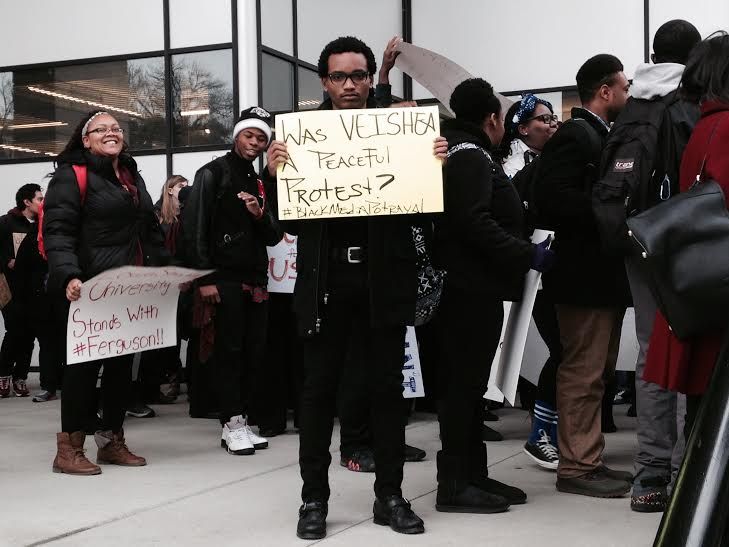Iowa State community protests social injustice
December 12, 2014
Students and citizens marched around campus peacefully and silently in protest of what they view as social injustice.
Members of multiple multicultural student campus organizations and local residents gathered at Parks Library on Friday, Dec. 12, to march around Central Campus, protesting the recent events in Ferguson, Mo., and New York City.
“It’s important to bring this issue to Ames because not everyone is recognizing that it’s going on. I’ve talked to plenty of people and they don’t know anything about the case,” said Lakeba Scott, vice president of the ISU NAACP chapter. “We’re trying to bring awareness and build support for this cause.”
One sign read “Black Lives Matter” and Scott said some interpret that as all lives matter.
“While they do matter, of course all lives matter, there is a bigger problem in the black community with men being killed,” Scott said.
Olivia Erickson, junior in child, adult and family services, saw the march on campus and said she knew what it was they were marching for.
“Our society right now is so messed up. It isn’t just in Missouri, it’s all over the nation,” she said.
Tom Hill, senior vice president for student affairs, spoke when the march came full circle at the library.
“What you are doing here today is very, very important,” Hill said. “Thank you for your willingness to make it known that what’s going on today is unacceptable.”
He said he respected the peaceful manner in which the students and residents went about the protest.
Edna Clinton, an Ames resident since 1966, Wayne Clinton, Story County supervisor and Hill described themselves as products of the 60s. All said they were shocked that they were still protesting for rights in 2014.
“We never thought or dreamt that we would still be fighting these injustices today,” Wayne Clinton said.
Hill said protests like the ones he’s seen in the past year are similar to the protests he saw in the 60s.
“Anybody who decides that this isn’t important, we stand the chance of repeating history,” Hill said. “We can’t do that.”
The protest was about the right to the “human condition,” Hill said, and that the issue hits home for him.
“I’ve got grandchildren and children who look like you,” Hill said. “I would not want one of mine, to just because…they happened to look like me, end up coming home in a box or a bag,” he said. “It is personal.”
Hill brought up Eric Garner, who died in Staten Island, New York, after police officers held him in a chokehold for 19 seconds.
“[Eric Garner] looks like me,” Hill said. “He clearly wasn’t doing anything. They could’ve taken him to jail, in my opinion.”
Wayne Clinton spoke to the crowd about those in the community and the nation, which may react negatively to the protest.
“We know there are many who will question us and wonder why we’re here. They have not lived some of the life experiences that we are living,” he said. “Where they’re coming from is totally different than where you’re coming from. In order for us to make a difference, we have to be able to show that we stand for something.”
Wayne Clinton discussed what could be done to narrow the gap between law enforcement and the people. He suggested students tell police some of their life experiences.
“It is only through collective dialogue that we can make a difference,” he said.
Hill then stepped up to speak on the law enforcement that was present and how assumptions can be made from just a few bad events.
“It is a law enforcement issue, but I want to be very clear and make the point that not everyone is painted with the same brush,” Hill said.
After Hill and the Clintons spoke, the crowd took a four-and-a-half minute silence, with some lying on the ground to represent the time Michael Brown’s body was on the street in Ferguson, Mo.
Hill made it a point to say people should not be discouraged when met with backlash and to not let the issue rest.
“Do not let this stop here,” Hill said. “We have to continue this.”







